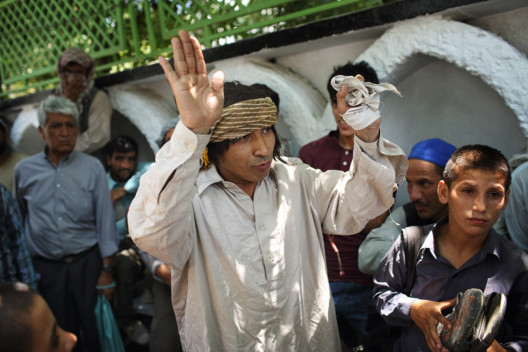
On a street corner, surrounded by unemployed men, Ibrahim Abed is holding court. Wearing a mop-top wig and ragged clothes, his eyes are hazy as he slurs towards a television camera. On this day, he’s a drug addict — and he’s running for office.
“I am so poor, my children don’t love me. I have no money to buy food. So I am going to nominate myself for a parliament seat,” Abed rants. “If I win, I will give you all free clothes and shoes. But when you guys call me I will not answer your calls. And I will not let you guys meet me.”
The crowd erupts in laughter. Afghanistan’s politicians are known for empty promises.
In a nation convulsed by nearly 14 years of war, a dysfunctional government and social woes, Abed provides an escape, if a temporary one. Every week, millions of Afghans turn on their televisions to watch the comedian’s skits, stand-up routines and talk show. He is so ubiquitous that when he prowls Kabul’s streets for new material, people wave or shake his hands — or simply shout “Abed!”
“He’s a lot of fun to watch,” says Mohammad Yassin, a construction worker who said he hadn’t found work in weeks.
Humour has long been a part of the social fabric here. Afghans revel in telling jokes, poking fun at other ethnic groups or people from different provinces. But Abed transports his comedy to a new level, zeroing in on society’s faults and peccadilloes. His antics — a meld of Robin Williams, Jim Carrey, and Mr Bean — bring a heightened awareness to the challenges facing the country.
“Ibrahim Abed brings out the reality of the country in terms of comedy,” said Masoud Sanjer, head of entertainment for Tolo, the network that runs Abed’s programmes. “If you talk about bribes, people won’t pay much attention. But when Abed acts at that, he makes people aware of what’s wrong and what’s right.”
No subject is off-limits for Abed, a slim father of eight in his mid-30s who drives a beat-up blue sedan. This Eid, he irreverently blasted the tradition of men giving gold and other wealth to the families of their fiancées or in-laws. In his skit, Abed offered vegetables — and was then beaten up by his would-be mother-in-law.
The country’s leaders, too, provide fertile inspiration. Contorting his face into impossible positions, changing his voice at will, Abed has performed uncanny impersonations of President Ashraf Ghani and his predecessor, Hamid Karzai. He has also taken to task Ghani’s chief executive, Abdullah Abdullah, as well as government ministers.
“We can see the tragedy everywhere in Afghanistan,” Abed said. “People are looking for a cause to love. That’s why I am making them laugh.”
Abed himself is a victim of that tragedy. When he was 12, he picked up a small pen-like object. It was a land mine, and it blew up in his left hand. He lost two fingers and still can’t move a third. That’s why in all his routines, he tucks his left arm behind his back.
By his teens, Abed had developed a reputation for his comedy in the eastern city of Jalalabad, where he grew up. He was constantly invited to dinners and parties to tell jokes.
He even managed to make the Taliban laugh. Having heard of Abed, the local commander invited him to his house. Among other jokes, Abed recalled telling one about the Taliban religious police mistakenly forcing a Hindu to pray in a mosque five times a day. Abed said the commander found him so hilarious that he handed him a wad of cash.
By the time the Taliban regime collapsed in 2001, Abed had graduated from nursing school and was working in a hospital. Soon he had become an Afghan version of Patch Adams, the movie character played by Robin Williams. Abed walked around the ward making children and adults laugh. It was a form of therapy, as in the movie.
“In my section of the hospital, the patients got fine in two or three days maximum,” Abed boasted. “I was making them happy and that’s why they got well earlier than others.”
In 2007, Abed’s friends encouraged him to compete in “Khaanda Bazaar” (Laughing Bazaar), a competition run by Tolo to find the nation’s best comedian.
Of 10,000 contestants, Abed was a finalist. But he could not afford a bus ticket to the capital, Kabul, to take part in the national finals. So he hitchhiked. Once there, he told jokes about the judges and about the Taliban — and he won.
Tolo offered him a job, and he has forged a presence on several shows a week since. He writes his own routines and said he has full editorial freedom, as long as he doesn’t cross some red lines: no jokes about ethnic groups or religion. And while he can imitate well-known Afghans, he can’t insult them by name, especially the politicians or warlords.
That’s fine with Abed. Afghanistan is a place where people are routinely kidnapped, tortured or killed. “I am scared of these guys,” he said.
He still remembers the day he told a joke about former mujahideen leaders in a room with friends. Somehow, word spread, and he was soon receiving death threats, he recalled.
On this day, he decided to focus on drug addiction after asking himself a simple question: why does Afghanistan have so many heroin addicts? He said he hopes that showing lawmakers’ apathy and manipulation might bring change.
“When the government gives me my black-tinted window armoured vehicle, you have to run after me,” Abed, the drug addict, told the crowd.
“Ibrahim Abed! Long Live, Ibrahim Abed!” they chanted, playing along with his faux election campaign.
His fans understand his humour.
Politicians “before the elections have come here many times. And after they entered the parliament we never hear from them again,” said Mohammad Daoud, a construction worker. “It’s the reality.”
But even comedy has some limits in a country where the economy is sliding and unemployment is rising. “He’s here to make fun of you guys,” yelled a man named Reza, who like many Afghans uses one name. “It’s true we cannot find jobs. But we are still humans.”
Abed forged ahead. And soon the crowd again burst into laughter.
“Long Live Ibrahim Abed!” they chanted.
–Washington Post












